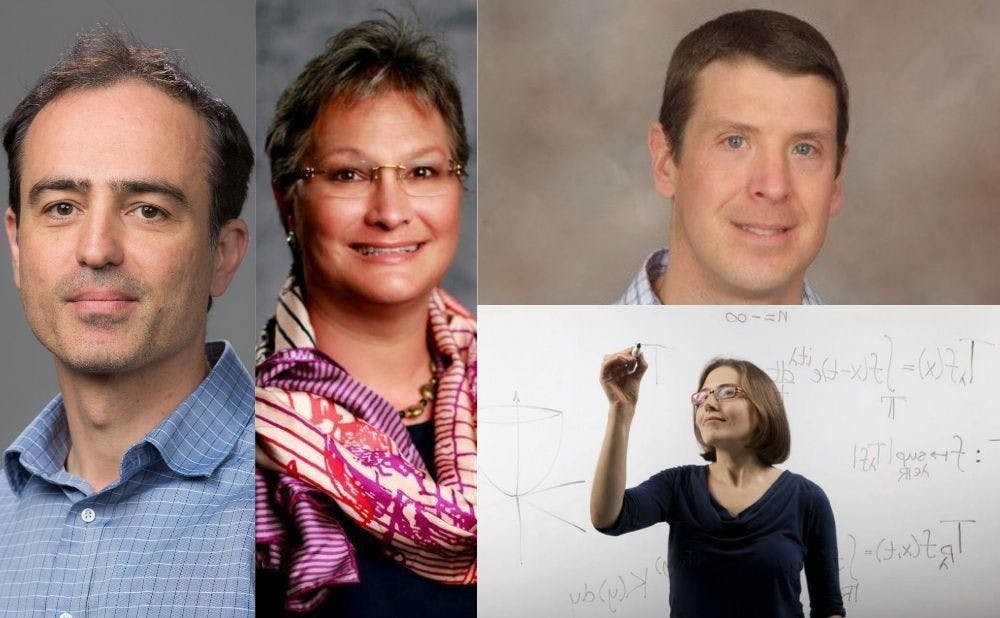Four Duke faculty members received a prestigious early career award for scientists and engineers, the White House announced in a July 2 news release.
The Presidential Early Career Award for Scientists and Engineers is granted to science and engineering faculty early in their careers for their independent research and leadership potential. Here are the recipients from Duke:
- Michael Boyce, assistant professor of biochemistry
- Nicolas Cassar, professor of biogeochemistry in the Earth and Ocean Sciences Division
- Lillian Pierce, Nicholas J. and Theresa M. Leonardy associate professor of mathematics
- Tracey Yap, associate professor in the School of Nursing
Federal agencies provide five years of funding to the recipients of the award to further their research. The Foundation describes the award as the “highest honor bestowed by the U.S. government on outstanding scientists and engineers beginning their independent careers.”
“I was thrilled to hear about the PCASE awards to these wonderful scholars,” Provost Sally Kornbluth said in a Duke news release. “These awards are richly deserved testaments to their outstanding research. We are very fortunate to have them as members of our faculty.”
Boyce studies how protein glycosylation—the attachment of a carbohydrate to another molecule—affects cell signaling and function. His research into glycans carries implications for our understanding of human health, including cancer and neurodegenerative diseases.
“I’m honored and grateful to receive the PECASE award,” Boyce wrote in an email to The Chronicle. “I am active in working to promote diversity, inclusion and equity in science, both at Duke and through national organizations, and I hope recognition from the PECASE will help me draw more positive attention to that important goal.”
Researching climate is one goal of Cassar’s work, which examines three of the most common elements on Earth—carbon, oxygen and nitrogen. From observing phytoplankton in the ocean to studying the atmosphere, Cassar aims to tease apart the processes that influence the cyles that major elements undergo.
Cassar did not respond to comment for The Chronicle.
Pierce, who also recently won a Birman Fellowship, researches analytic number theory and harmonic analysis. She is currently working with Diophantine equations—of which the Pythagorean Theorem is an example—and trying to figure out potential solutions.
"The National Science Foundation was a critical source of funding for my graduate education and postdoctoral work, and now it is also central to funding my research as a faculty member and supporting my own students and postdocs,” Pierce said in the Duke news release. “I am honored that the National Science Foundation nominated me for this award, and I am thrilled to see mathematics recognized by the White House.”
Aiming to improve nurses’ quality of care, Yap has worked on employing reminder messages and alerts to better patients’ movement. The work will hopefully lead to improved patient outcomes.
Yap did not provide a response to The Chronicle.
Appreciative that they received the PECASE, the 85 awardees believe they have a duty “to advance scientific knowledge” and “to communicate that knowledge in a way that benefits the lives of people in the United States and around the world,” they wrote in a statement.
“We believe that the United States must engage with the international community to confront the threats posed by climate change and other global perils,” they wrote. “We have an immense opportunity to bring humanity together to advance scientific progress and to work towards a set of common goals—not just as citizens of our respective countries, but as the collective inhabitants of the Earth.”
Editor's Note: The Chronicle requested comment from the four Duke faculty members, and Cassar and Yap did not provide a comment.
Get The Chronicle straight to your inbox
Sign up for our weekly newsletter. Cancel at any time.

Stefanie Pousoulides is The Chronicle's Investigations Editor. A senior from Akron, Ohio, Stefanie is double majoring in political science and international comparative studies and serves as a Senior Editor of The Muse Magazine, Duke's feminist magazine. She is also a former co-Editor-in-Chief of The Muse Magazine and a former reporting intern at PolitiFact in Washington, D.C.

